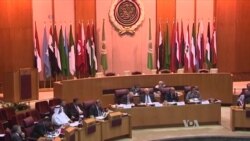Libya’s internationally recognized government is urging Arab countries to launch airstrikes against Islamic State-affiliated militants who have carried out beheadings and crucifixions and taken control of the coastal city of Sirte.
After an emergency meeting in Cairo Tuesday, the Arab League pledged support for Libya’s call for military action and a need to form a joint Arab force, but did not offer any specifics.
On Wednesday, Libyan Foreign Minister Mohammed al-Dairi said the Arab League agreed to meet August 27 to discuss the possible formation of a force.
The United States has condemned atrocities committed by Islamic State-affiliated militants in Libya, but continues to back U.N.-led political dialogue. The talks are designed to unite Libya, which is split between an elected parliament and government that controls the east, and an Islamist militia-backed government based in Tripoli.
The State Department Sunday released a joint statement on Libya from the U.S., France, Germany, Italy, Spain and the United Kingdom.
The countries condemned “barbaric acts by militants” and welcomed the U.N. dialogue.
“We reiterate that there is no military solution to the political conflict in Libya,” the statement said.
Concerns UN process could be limited
But there is concern that the U.N. process is too limited in its scope to address Libya’s overall instability.
“It is one thing to do diplomacy through the U.N. process,” said Brian Katulis, a Center for American Progress analyst who served on a U.N. panel on Libya. “It is just incomplete without any sort of strategy that has the security component to it,” he said.
The United States, Egypt and the United Arab Emirates have launched limited airstrikes against militant targets in Libya.
But Katulis said there is a lack of a U.S. appetite for a broader military strategy.
“There is a certain understandable risk aversion to U.S. military action, direct intervention and even support when you look at the dynamics around the region, when you look at our own recent experience in the Iraq war and other places,” he said.
Support for Libya hampered by instability
Libya’s instability heightened following the 2011 ouster, and later killing, of former leader Moammar Gadhafi.
The internationally recognized government, based in the country’s east, has called for the U.N. to lift an arms embargo so the country can better defend itself against militant attacks.
The U.N. imposed the embargo in 2011 because of concerns that weapons could fall into the hands of multiple armed groups and factions in Libya.
Reluctance to deal with Libya’s fractured government could also be playing a role in the U.S. decision to limit its response, says Sarah Feuer, a North Africa analyst with the Washington Institute for Near East Policy.
“The risk of giving military assistance to the internationally recognized side, if you will, is that it would feed a narrative that the U.S. is intervening and choosing sides,” she said.”
The U.S. effort to fight Islamic State militants in Iraq and Syria is another factor, Feuer said.
The United States has a “lot of fires burning” in the Middle East and North Africa, she said.
Conversely, Feuer noted that because the Islamic State is the “common enemy” of the country’s rival factions, a desire to defeat the militants could spur both sides to reach an agreement in the U.N.-mediated political dialogue.





